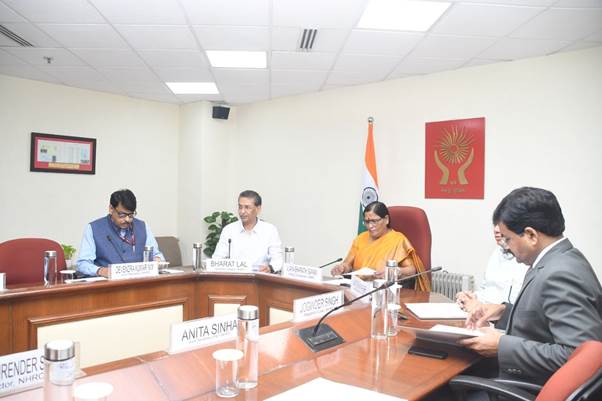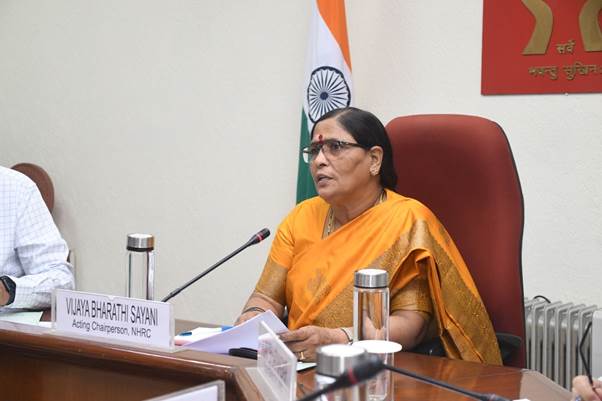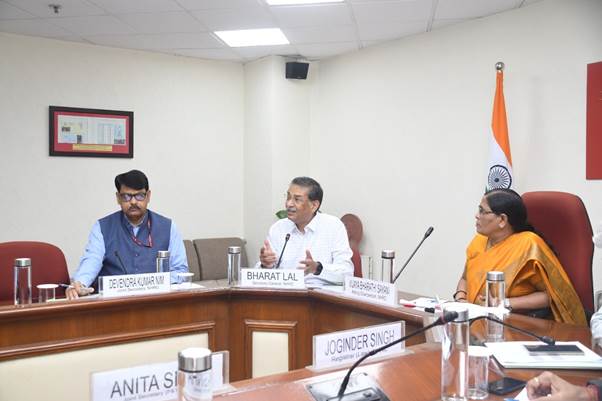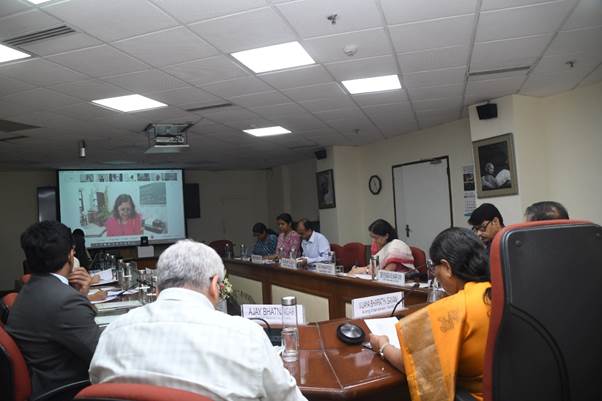National Human Rights Commission
NHRC, India organizes an open house discussion on ‘Tribal Education in India: Problems, Policies and Perspective’
Acting Chairperson, Smt. Vijaya Bharathi Sayani calls for a culturally sensitive education system that integrates and respects the diverse heritage of tribal communities
An urgent need emphasized in the discussions for empirical data, necessitating tribal-centric research in universities to better understand and address specific educational challenges faced by these communities
प्रविष्टि तिथि:
30 AUG 2024 6:22PM by PIB Delhi
The National Human Rights Commission (NHRC), India organized an open house discussion in hybrid mode on ‘Tribal Education in India: Problems, Policies and Perspective’ at its premises in New Delhi. Chairing the meeting, Acting Chairperson, Smt. Vijaya Bharathi Sayani called for a culturally sensitive education system that integrates and respects the diverse heritage of tribal communities. She said that education will help in empowering tribal communities and advancing societal progress overcoming persistent barriers such as geographical isolation, language differences, poverty, and early marriage despite substantial progress and various government initiatives.

Smt Vijaya Bharathi Sayani said that the Commission is committed to advocating quality education for all, assessing current programs, and addressing gaps to promote inclusivity and equitable development in tribal education. She also emphasized the need for collaborative sustained efforts among governmental bodies, NGOs, and tribal groups for this purpose.

Before this, in his opening remarks, NHRC Secretary General, Shri Bharat Lal highlighted the gaps in tribal education and emphasized the need for targeted interventions to enhance and uplift educational outcomes in these communities. He said that lower literacy rates and higher dropout rates in tribal areas are often linked to specific challenges, such as inadequate access to quality education, the lack of culturally relevant curriculum, poor teacher-student ratios, and insufficient educational infrastructure.

Shri Lal underscored the importance of addressing these gaps to ensure equitable and inclusive education, so every tribal child has an equal opportunity to succeed. He also stressed the need to improve tribal representation in higher educational institutions like IITs and IIMs, targeted scholarship programs, mentorship, and preparatory courses to bridge the educational divide and help tribal students excel in these prestigious institutions.
Earlier, giving an overview of the open house, NHRC Joint Secretary, Shri Devendra Kumar Nim expressed concern over the high dropout rates and declining Gross Enrollment Ratios among tribal students. He called for targeted interventions and a comprehensive discussion to identify gaps, analyze existing policies, and explore diverse perspectives to shape a more inclusive educational system and ensure a brighter, equitable future for the tribal population in India.
The meeting covered several key agendas: identifying gaps and challenges in tribal education, analyzing existing policies and programs, and exploring perspectives and ways forward. Discussions focused on the persistent barriers to educational access for tribal communities, such as geographical isolation, language differences, and socioeconomic issues. The effectiveness of current initiatives like Ashram Schools and Eklavya Model Residential Schools (EMRSs) was evaluated to pinpoint areas needing improvement.

Some of the key suggestions that emerged during the discussions were as follows:
• There is an urgent need for empirical data, necessitating tribal-centric research in universities to better understand and address specific educational challenges faced by these communities;
• A comprehensive and integrated policy approach is required, focusing on the development of proper facilities and infrastructure, including dedicated hostel facilities for female tribal children;
• Increasing community engagement and outreach is crucial for improving enrollment rates, while ensuring basic facilities such as drinking water, sanitation, and adequate hostel accommodations, particularly in remote areas, is essential;
• Capacity-building programs for teachers are necessary to sensitize them to tribal cultures and languages, facilitating better communication and understanding;
• Incorporating local languages at the primary level is important for easing comprehension and enhancing the overall learning experience for tribal students.
The participants included NHRC DG (I) Shri Ajay Bhatnagar, Registrar (Law), Shri Joginder Singh, Smt. Archana Sharma Awasthi, Joint Secretary, Department of School Education & Literacy, Ministry of Education; Shri Sunil Kumar Barnwal, Additional Secretary, Department of Higher Education, Ministry of Education; Shri Surat Singh, Director, National Commission for Scheduled Tribes; Shri Ajeet Kumar Srivastava, Commissioner, National Education Society for Tribal Students; Shri Kripanand Jha, Secretary, Department of Scheduled Tribes, Jharkhand; Mr. Vijesing Vasave, Joint Secretary, Tribal Development Department, Maharashtra; Shri Yogesh T. KAS, Director, Scheduled Tribes Welfare Department; Shri Narendra Kumar Dugga, Commissioner, Tribal & Scheduled Caste Development Department, Chhattisgarh; Prof. Alok Kumar Chakrawal, Vice Chancellor, Guru GhasidasVishwavidyalayas, Koni, Bilaspur; Prof. (Dr.) Madhukarbhai S. Padvi, Vice Chancellor, Birsa Munda Tribal University, Gujarat; Prof. T.V. Kattimani, Vice Chancellor, Central Tribal University of Andhra Pradesh; Prof. Ravindra Ramesh Patil, Professor, Jamia Millia Islamia, New Delhi; Dr. Gauri Shankar Mahapatra, Associate Professor, Indira Gandhi National Tribal University, Amarkantak; Dr. Satyakam Joshi, Acting Director & Professor, Veer Narmada South Gujarat University; Shri Apoorva Oza, Director, Aga Khan Rural Support Programme, India; Shri Mahesh Sharma, Social Activist, Founder Shivganga Jhabua etc.
*****
NSK
(रिलीज़ आईडी: 2050200)
आगंतुक पटल : 2293